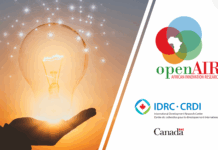Photo credit: Jeremy de Beer
By Jeremiah Baarbé, cross-posted from his blog.
How can farmers and researchers use open data to work together for food security?
Agricultural research is changing as researchers and farmers are seeing the benefits of working together. Farmers enjoy solutions and best practices proven by research. Researchers benefit as they gain access to grounded knowledge and experience. Open data and other forms of open access to knowledge help facilitate these relationships.
On September 19th, 2017 I represented Open AIR and GODAN in a webinar hosted by GFAR, the Global Forum on Agricultural Research and Innovation. The webinar focused on how farmer rights facilitate and frustrate cooperation with researchers. You can watch my talk and the whole video below.
Open access is an important tool to facilitate communication between researchers and farmers. In our digital world, open access expands the reach of research. These two groups are able to share knowledge and work together without ever meeting or directly communicating. Open access to research articles and books provides farmers with incredible resources, allowing them to apply best practices, solve problems, and grow crops more efficiently.
Open data, in particular, brings farmers and researchers together. In our digital economy, data is now the world’s most valuable resource. This is especially true for agricultural data, which has become as important as land and labour in managing farms. Agricultural data is found across the food-production chain. Governments make policy based on land use data, farmers rely on data to decide when to plant crops and what price to ask for their crops at market, and scientists use data to drive their research.
Opening agricultural data facilitates communication, spreading the benefits across the data ecosystem. Scientists gain access to important data sources, often directly from farmers. Developers are able to build innovative tools. Farmers gain access to new insights and ways to make decisions. These benefits are part of why GODAN, the Global Open Data for Agriculture and Nutrition sees open data as key in meeting Sustainable Development Goal 2 of zero hunger.
Open data is data that can be freely used, re-used and distributed by anyone – subject only, at most, to the requirement to attribute and sharealike.
The ability for farmers and researchers to open and access data is controlled by law. These laws, based in intellectual property, identify three categories of stakeholders. They give rights to some stakeholders and responsibilities to other stakeholders. Professor Jeremy de Beer, in a paper published by GODAN, described how laws governing ownership of data allow some stakeholders to control access and use. Laws that govern use of data include privacy, trade secrets, plant breeder rights, and access and benefit sharing. Arguably, the most important set of laws for governing access to data is copyright, the ability to control who accesses and uses original expressions. Although raw agricultural data cannot be owned under copyright, compilations of data in databases attract copyright and can be owned.
Farmers contribute data, gathered from their fields and crops. Third parties including governments, corporations, and researchers, collect data. Consumers, who may also be farmers, app developers, or other decision makers then consume data. Within this eco-system, copyright law favours collectors, giving them ownership of the data they compile. Consumers can only access data when collectors decide to share or license it. Contributors have few rights once the data is collected. The lack of rights for contributors creates risks, particularly for small-holder farmers. Because farmers are also the source of data, this vulnerability threatens trust and has the potential to limit access to data.
In a recent working paper, “A Data Commons for Food Security” my colleague Meghan Blom, supervisor Professor de Beer, and I offer a solution. We propose a model license and social certification scheme based on lessons learned from Creative Commons and the Fair Trade Movement. Once developed, collectors will be able to use the license to meet the needs of contributors. Farmers need engagement in decision of how collectors will use their data, assurances of privacy and control, to receive the benefits of their data, and to have access to data.











